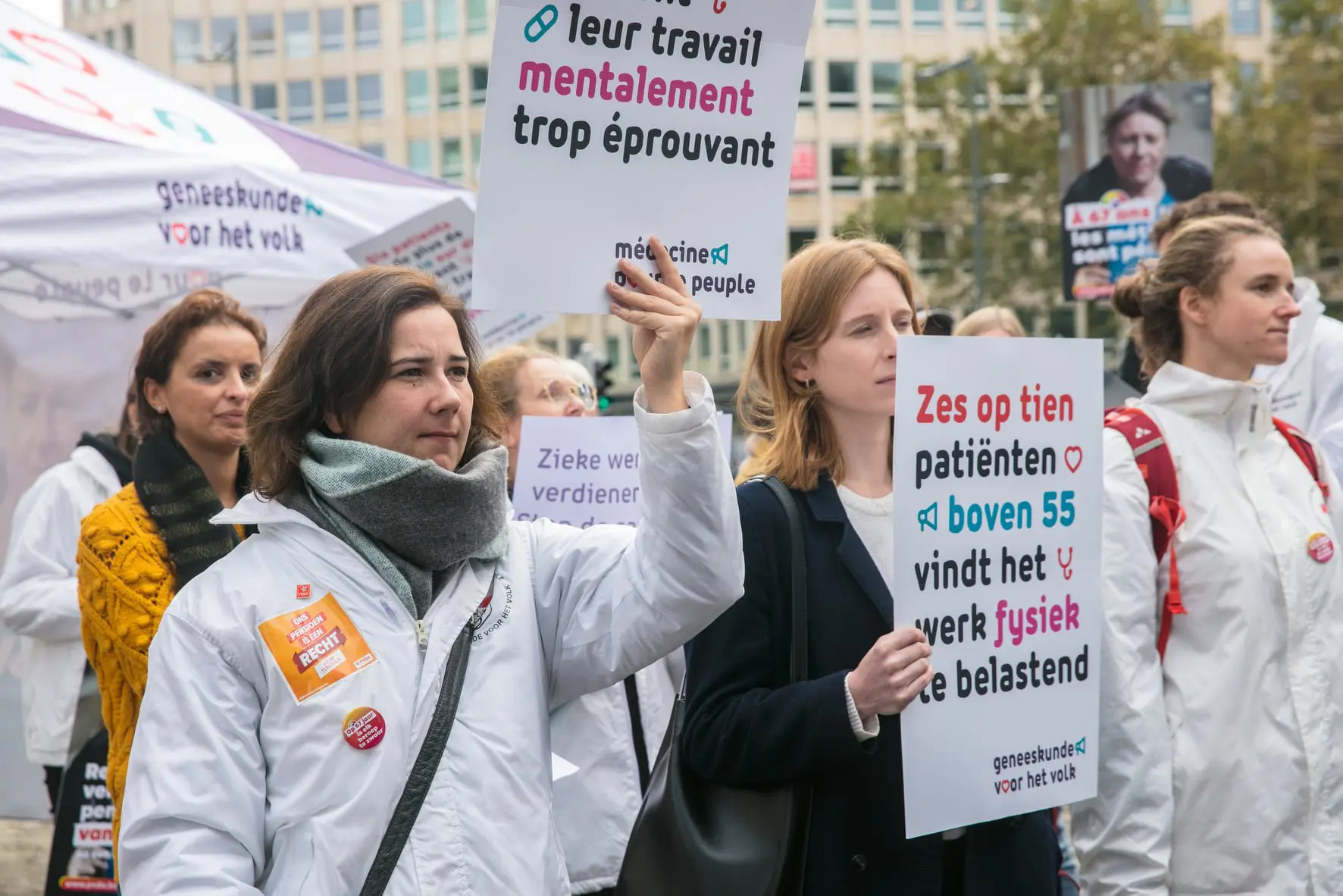INTERVIEW: “Health care is a human job! The logic of profit has no place here.”
Janneke Ronse is president of Médecine pour le Peuple, MPLP (Medicine for the people). With 220 employees in 11 medical offices, the association provides free health care to nearly 25,000 patients. In this interview, Janneke talks about the global struggle of health workers for better working conditions and quality public health care.
We are seeing health care workers’ protests all over the world. What’s going on?
The situation in the health sector was already very difficult before the pandemic. With the Covid-19 crisis, health care workers were hoping that working conditions would finally improve. For this reason, ministerial speeches followed one another to praise and thank their courage and the population applauded from their balconies every evening. However, it seems that, as the months go by, the crisis in the health sector has disappeared. But on the ground, people are exhausted. The anger is very strong.
Last week, I spoke to a British nurse. He is closely involved in strikes across the country for better working conditions and in particular, for the preservation of the NHS, the British public health service. In the UK, there is no automatic indexation. In other words, health care workers are 10% poorer because of inflation. He explained to me that more and more working nurses were going to the food bank.
Of course, each country has its own context. But the working conditions in health care have been deteriorating globally for years. Health care workers can no longer give patients the care they would like to give. This is killing the motivation of health care workers. It seems that they have to treat people mechanically: like cars on an assembly line in a factory. Recently, a home care nurse told me that she only had 9 minutes to clean a person. She told me that she quickly felt overwhelmed and unprepared when a patient needed more time for companionship or comfort.

There are more and more controls, administrative work is becoming more important than care, and staff must work with more and more flexibility. Schedules are constantly changing and the workload is enormous. Cost savings in the health care sector are the main problem. Staff are now seen as a budget, even though they are providing care. To break this situation, we need to do something that goes against the grain of what is being done today. But governments are content to tinker, or even take measures that make the problems worse. That is why unions and social movements around the world are taking to the streets today.
Efficiency, time management and administrative tasks seem to become more important than patient care. How does MPLP still manage to put patients first?
Providing health care is, in essence, human work. The logic of profit has no place in it. Medicine for the People operates on a flat fee basis. We are not paid by performance, but have a fixed budget that allows us to cover all our costs. Thus, we are less guided by pennies and we can devote more time to our patients. For example, we work with 20-minute consultations. This is longer than in an average general practice.
It is very important for us to accompany our patients. This is what we call “the doctor as comrade”. We involve people in their diagnosis, we take more time to explain the social determinants of the disease, we decide on the directions to follow together. Above all, we start from the needs of the patients and organize our team accordingly. If we see a lot of people with psychological problems in a particular practice, we may decide to recruit an additional psychologist. This model gives us a lot of flexibility. It also encourages us to work in a more preventive manner. In a lump sum system, it is interesting to avoid people getting sick and needing a lot of care.
An alternative health model, in which there is no room for profit, is urgently needed. Are community health centers the answer?
Health care is obviously broader, but community health centers are still a very important part of it. With a strong first line of care, many other problems can be prevented. For example, with good home nursing care, a good family doctor and a more informal care team, many people can be kept out of hospital.
We’re a very good country at treating people, but when it comes to prevention, we do very poorly. We only invest 2% of the health budget in prevention. For us, that figure should be at least 5%. Compared to other Western European countries, Belgium is lagging behind in terms of preventable deaths. Yet we have good prevention campaigns. But it is not really developed on the ground. With sufficiently staffed prevention centers throughout the country, we could give more weight to these campaigns and pass on the information to the citizens effectively.
Are working conditions better in community health centers? How is the work of care different?
Why do we choose a profession related to care? Because we want to take care of people. Sometimes we forget the importance of job satisfaction. If you can’t really care for others, you hit a wall in the long run. The burnout rate in the care sector is twice as high as in other professions. Many people are leaving the sector, but I think we can bring them back by seriously improving their working conditions.
At MPLP, we work very much as a team. Our colleagues work together to determine the best care for patients in their practices. Teamwork allows us to hand off our administrative tasks to other colleagues and to collaborate with other disciplines, such as nurses and physicians.


